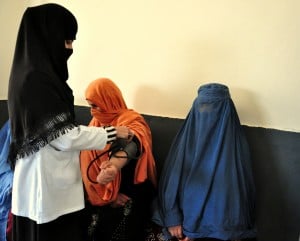An inspirational story of a young Afghan woman who fought all biases to support her community
 CHARSADDA, 07 May 2014, PAKISTAN (UNHCR): On a cold winter morning, Zarghona* stands alert alongside a lady doctor in the small, dark dome used as vaccine room at a Basic Health Unit (BHU) in the Kababiyan Refugee Village in the north-western Province of Khyber Pakhtunkhwa. She greets every patient with a bright smile and guides them in the right direction – all female patients seem at ease with her.
CHARSADDA, 07 May 2014, PAKISTAN (UNHCR): On a cold winter morning, Zarghona* stands alert alongside a lady doctor in the small, dark dome used as vaccine room at a Basic Health Unit (BHU) in the Kababiyan Refugee Village in the north-western Province of Khyber Pakhtunkhwa. She greets every patient with a bright smile and guides them in the right direction – all female patients seem at ease with her.
For this nineteen-year-old Afghan refugee, finding a job in a refugee village where she interacts with male medical staff was no less than a miracle. Zarghona works as a Field Health Supervisor (FHS) in a conservative village where working outside the boundaries of the house remains a taboo for women. She faces opposition on a daily basis; nevertheless, with dedication and perseverance she has succeeded in gaining the trust of the female population of the refugee village in which she lives. Zarghona is now a link between the community and the BHU, where educating refugee women on health-related issues is all part of her day’s work.The BHU where Zarghona works every morning is the only health centre in Kababiyan, catering to the needs of some 2,756 families (approximately 11,664 individuals). Thanks to a generous contribution from the Government and people of Japan, patients here have access to first aid, out-patient services, child vaccination and reproductive healthcare. The BHU has recently offered Voluntary Confidential Counselling & Testing (VCCT) where patients can be tested for HIV. Positive cases are referred to the Hayatabad Medical Complex in Peshawar for further investigation.
One-by-one, Zaghona attends to each of her patients. By midday, the crowd at the BHU has reduced and she can enjoy a few moments with her colleagues over a cup of tea. “As a child growing up in poverty, I decided for myself that I would work hard and support my family.” Zarghona reflects. It was this determination which steeled her against the criticism she received for going to school.
Patriarchal values and moral policing are deeply embedded in her society. Initially, even her close relatives opposed her decision to enrol in school. “My brother left home in protest and threatened my parents that he would not return until I dropped out of school.” The tactic worked: Zaghona had to submit to the will of her brother. Still, her ambition to support her family remained alive. “I left school and stayed home for two years. During this period, I constantly engaged my parents in discussion on the importance of female education and I’m proud that eventually I succeeded in changing my parents’ minds”, Zarghona told a visiting UNHCR team.
Although she persuaded her parents, the family’s financial situation was perilous and they could not afford the additional costs of her schooling. She worked with a Polio eradication team for 300 PKR (3 USD) per day, but kept this hidden from her parents, saving every penny to complete her education. Her savings enabled her to complete the Lady Health Visitor (LHV) course in two years, something that she remembers with pride. “It is very hard to earn money, and I know the value of hard work and determination.”
Finally, when Zarghona was appointed as an FHS, she informed her parents of her decision to work at the BHU. “My parents were concerned about the family reputation and were hesitant to accept my decision,” said Zaghona, adding “but after they visited the BHU, met the staff here, and saw the atmosphere, they agreed to allow me [to work].” Now she earns 7,000 PKR (70 USD) per month and proudly helps her father to make both ends meet.
Zarghona has since sought to further her studies, undertaking a four-year diploma in health and medical science (DHMS). She enjoys the trust of all females visiting the BHU for post- and ante-natal healthcare. Zarghona takes great pride in her work and continues to benefit and inspire other refugee girls just like her.
* Her name has been changed to protect her identity.
By Uzma Irum in Kababiyan Refugee Village, Khyber Pakhtunkhwa
Share on Facebook Share on Twitter